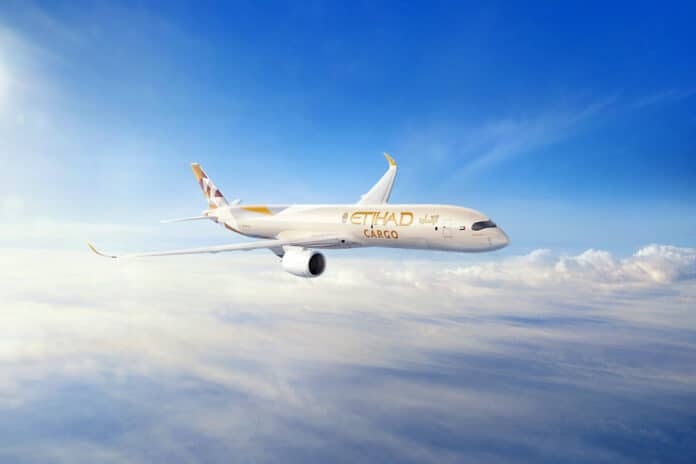Etihad Airways has firmed up its order with Airbus for seven new generation A350F freighters, following its earlier commitment announced at the Singapore Airshow. The freighters will upgrade Etihad’s freight capacity by deploying the most efficient cargo aircraft available in the market.
This order of the A350F sees the national carrier of the UAE expanding its relationship with Airbus and adding to its existing order of the largest passenger version of A350-1000s, five of which have been delivered.
Etihad has also firmed up a long-term agreement for Airbus’ Flight Hour Services (FHS) to support its entire A350 fleet, maintain aircraft performance and optimize reliability.
The A350F is the cargo version of the A350 passenger aircraft. The new-generation freighter is lighter and more fuel efficient compared to the previous generation.
The aircraft features a large main deck cargo door, with its fuselage length and capacity optimized around the industry’s standard pallets and containers. More than 70% of the airframe of the A350F is made of advanced materials, resulting in a 30-tonne lighter take-off weight and generating at least 20% lower fuel consumption and emissions over its current closest competitor.
The company says its A350F freighters fully meets ICAO’s enhanced CO2 emissions standards coming into effect in 2027. Including today’s commitment, the A350F has won 31 firm orders from six customers.
The A350F meets the imminent wave of large freighter replacements and the evolving environmental requirements, shaping the future of air freight. The A350F will be powered by the latest technology, fuel-efficient Rolls-Royce Trent XWB-97 engines.
“Airbus is delighted to extend its long-standing partnership with Etihad Airways, who recently introduced the A350 passenger services and is continuing to build on the Family with the game-changing freighter version, the A350F,” said Christian Scherer, Chief Commercial Officer and Head of Airbus International. “This new generation large freighter brings unprecedented and unmatched benefits in terms of range, fuel efficiency, and CO₂ savings, that support customers by enhancing operational efficiencies at the same time as reducing environmental impact.”
